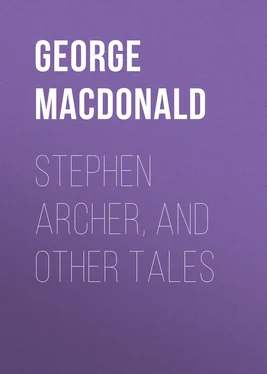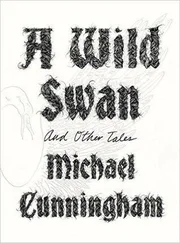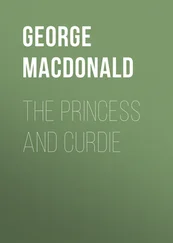George MacDonald - Stephen Archer, and Other Tales
Здесь есть возможность читать онлайн «George MacDonald - Stephen Archer, and Other Tales» — ознакомительный отрывок электронной книги совершенно бесплатно, а после прочтения отрывка купить полную версию. В некоторых случаях можно слушать аудио, скачать через торрент в формате fb2 и присутствует краткое содержание. Жанр: foreign_prose, foreign_religion, foreign_antique, на английском языке. Описание произведения, (предисловие) а так же отзывы посетителей доступны на портале библиотеки ЛибКат.
- Название:Stephen Archer, and Other Tales
- Автор:
- Жанр:
- Год:неизвестен
- ISBN:нет данных
- Рейтинг книги:4 / 5. Голосов: 1
-
Избранное:Добавить в избранное
- Отзывы:
-
Ваша оценка:
- 80
- 1
- 2
- 3
- 4
- 5
Stephen Archer, and Other Tales: краткое содержание, описание и аннотация
Предлагаем к чтению аннотацию, описание, краткое содержание или предисловие (зависит от того, что написал сам автор книги «Stephen Archer, and Other Tales»). Если вы не нашли необходимую информацию о книге — напишите в комментариях, мы постараемся отыскать её.
Stephen Archer, and Other Tales — читать онлайн ознакомительный отрывок
Ниже представлен текст книги, разбитый по страницам. Система сохранения места последней прочитанной страницы, позволяет с удобством читать онлайн бесплатно книгу «Stephen Archer, and Other Tales», без необходимости каждый раз заново искать на чём Вы остановились. Поставьте закладку, и сможете в любой момент перейти на страницу, на которой закончили чтение.
Интервал:
Закладка:
George MacDonald
Stephen Archer, and Other Tales
STEPHEN ARCHER
Stephen Archer was a stationer, bookseller, and newsmonger in one of the suburbs of London. The newspapers hung in a sort of rack at his door, as if for the convenience of the public to help themselves in passing. On his counter lay penny weeklies and books coming out in parts, amongst which the Family Herald was in force, and the London Journal not to be found. I had occasion once to try the extent of his stock, for I required a good many copies of one of Shakspere's plays—at a penny, if I could find such. He shook his head, and told me he could not encourage the sale of such productions. This pleased me; for, although it was of little consequence what he thought concerning Shakspere, it was of the utmost import that he should prefer principle to pence. So I loitered in the shop, looking for something to buy; but there was nothing in the way of literature: his whole stock, as far as I could see, consisted of little religious volumes of gay binding and inferior print; he had nothing even from the Halifax press. He was a good-looking fellow, about thirty, with dark eyes, overhanging brows that indicated thought, mouth of character, and no smile. I was interested in him.
I asked if he would mind getting the plays I wanted. He said he would rather not. I bade him good morning.
More than a year after, I saw him again. I had passed his shop many times, but this morning, I forget why, I went in. I could hardly recall the former appearance of the man, so was it swallowed up in a new expression. His face was alive, and his behaviour courteous. A similar change had passed upon his stock. There was Punch and Fun amongst the papers, and tenpenny Shaksperes on the counter, printed on straw-paper, with ugly wood-cuts. The former class of publications had not vanished, but was mingled with cheap editions of some worthy of being called books.
"I see you have changed your mind since I saw you last," I said.
"You have the advantage of me, sir," he returned. "I did not know you were a customer."
"Not much of that," I replied; "only in intention. I wanted you to get me some penny Shaksperes, and you would not take the order."
"Oh! I think I remember," he answered, with just a trace of confusion; adding, with a smile, "I'm married now;" and I fancied I could read a sort of triumph over his former self.
I laughed, of course—the best expression of sympathy at hand—and, after a little talk, left the shop, resolved to look in again soon. Before a month was over, I had made the acquaintance of his wife too, and between them learned so much of their history as to be able to give the following particulars concerning it.
Stephen Archer was one of the deacons, rather a young one perhaps, of a dissenting congregation. The chapel was one of the oldest in the neighbourhood, quite triumphant in ugliness, but possessed of a history which gave it high rank with those who frequented it. The sacred odour of the names of pastors who had occupied its pulpit, lingered about its walls—names unknown beyond its precincts, but starry in the eyes of those whose world lay within its tabernacle. People generally do not know what a power some of these small conventicles are in the education of the world. If only as an outlet for the energies of men of lowly education and position, who in connexion with most of the churches of the Establishment would find no employment, they are of inestimable value.
To Stephen Archer, for instance, when I saw him first, his chapel was the sole door out of the common world into the infinite. When he entered, as certainly did the awe and the hush of the sacred place overshadow his spirit as if it had been a gorgeous cathedral-house borne aloft upon the joined palms of its Gothic arches. The Master is truer than men think, and the power of His presence, as Browning has so well set forth in his "Christmas Eve," is where two or three are gathered in His name. And inasmuch as Stephen was not a man of imagination, he had the greater need of the undefined influences of the place.
He had been chief in establishing a small mission amongst the poor in the neighbourhood, with the working of which he occupied the greater part of his spare time. I will not venture to assert that his mind was pure from the ambition of gathering from these to swell the flock at the little chapel; nay, I will not even assert that there never arose a suggestion of the enemy that the pence of these rescued brands might alleviate the burden upon the heads and shoulders of the poorly prosperous caryatids of his church; but I do say that Stephen was an honest man in the main, ever ready to grow honester: and who can demand more?
One evening, as he was putting up the shutters of his window, his attention was arrested by a shuffling behind him. Glancing round, he set down the shutter, and the next instant boxed a boy's ears, who ran away howling and mildly excavating his eyeballs, while a young, pale-faced woman, with the largest black eyes he had ever seen, expostulated with him on the proceeding.
"Oh, sir!" she said, "he wasn't troubling you." There was a touch of indignation in the tone.
"I'm sorry I can't return the compliment," said Stephen, rather illogically. "If I'd ha' known you liked to have your shins kicked, I might ha' let the young rascal alone. But you see I didn't know it."
"He's my brother," said the young woman, conclusively.
"The more shame to him," returned Stephen. "If he'd been your husband, now, there might ha' been more harm than good in interferin', 'cause he'd only give it you the worse after; but brothers! Well, I'm sure it's a pity I interfered."
"I don't see the difference," she retorted, still with offence.
"I beg your pardon, then," said Stephen. "I promise you I won't interfere next time."
So saying, he turned, took up his shutter, and proceeded to close his shop. The young woman walked on.
Stephen gave an inward growl or two at the depravity of human nature, and set out to make his usual visits; but before he reached the place, he had begun to doubt whether the old Adam had not overcome him in the matter of boxing the boy's ears; and the following interviews appeared in consequence less satisfactory than usual. Disappointed with himself, he could not be so hopeful about others.
As he was descending a stair so narrow that it was only just possible for two people to pass, he met the same young woman ascending. Glad of the opportunity, he stepped aside with his best manners and said:
"I am sorry I offended you this evening. I did not know that the boy was your brother."
"Oh, sir!" she returned—for to one in her position, Stephen Archer was a gentleman: had he not a shop of his own?—"you didn't hurt him much; only I'm so anxious to save him."
"To be sure," returned Stephen, "that is the one thing needful."
"Yes, sir," she rejoined. "I try hard, but boys will be boys."
"There is but one way, you know," said Stephen, following the words with a certain formula which I will not repeat.
The girl stared. "I don't know about that," she said. "What I want is to keep him out of prison. Sometimes I think I shan't be able long. Oh, sir! if you be the gentleman that goes about here, couldn't you help me? I can't get anything for him to do, and I can't be at home to look after him."
"What is he about all day, then?"
"The streets," she answered. "I don't know as he's ever done anything he oughtn't to, but he came home once in a fright, and that breathless with running, that I thought he'd ha' fainted. If I only could get him into a place!"
"Do you live here?" he asked.
"Yes, sir; I do."
At the moment a half-bestial sound below, accompanied by uncertain footsteps, announced the arrival of a drunken bricklayer.
Читать дальшеИнтервал:
Закладка:
Похожие книги на «Stephen Archer, and Other Tales»
Представляем Вашему вниманию похожие книги на «Stephen Archer, and Other Tales» списком для выбора. Мы отобрали схожую по названию и смыслу литературу в надежде предоставить читателям больше вариантов отыскать новые, интересные, ещё непрочитанные произведения.
Обсуждение, отзывы о книге «Stephen Archer, and Other Tales» и просто собственные мнения читателей. Оставьте ваши комментарии, напишите, что Вы думаете о произведении, его смысле или главных героях. Укажите что конкретно понравилось, а что нет, и почему Вы так считаете.












